BOZCAADA
Οκτ 17, 2025 Κινηματογράφος 0
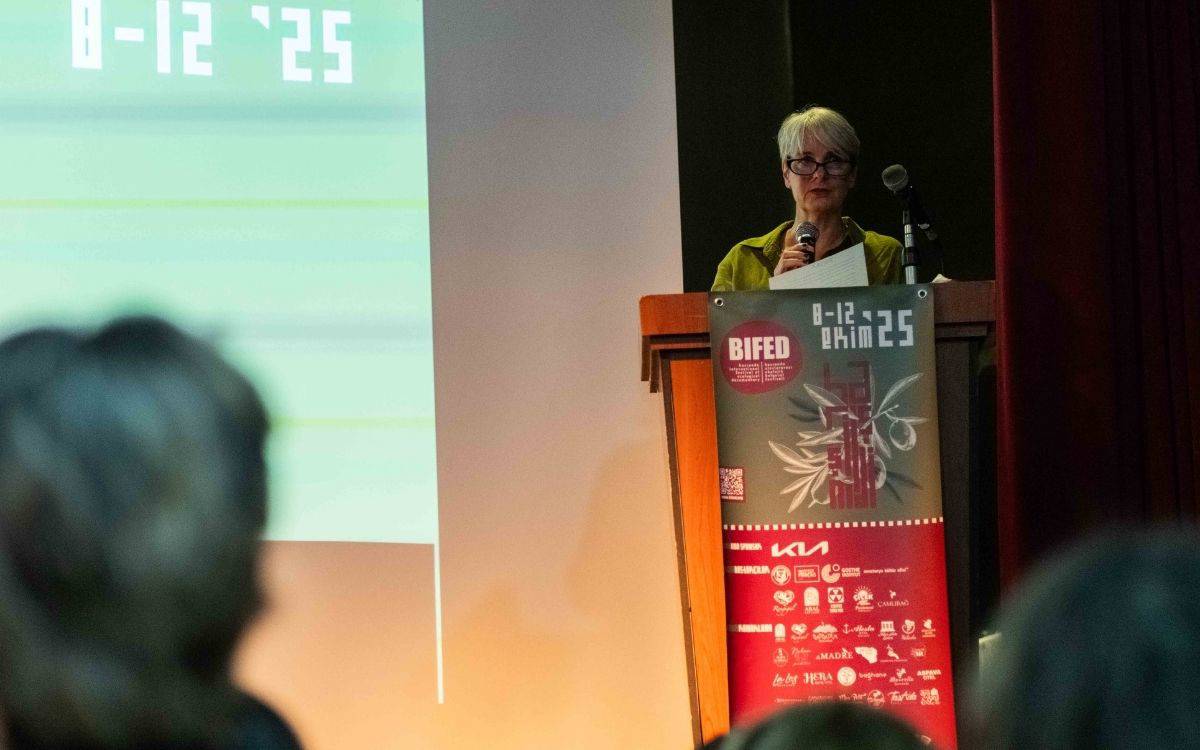
FILM FESTIVALS
BOZCAADA FILM FESTIVAL
October 8-12, 2025
Bozcaada: written by Giannis Fragoulis
Tenedos is known as Bazcaada, it is opposite Kumburun and the journey by road is easy and pleasant. The ferry took us to the island, a 20-minute trip, and we are ready to go and meet the people of the Festival. It doesn’t take long to feel like you’re part of the family. The smiles are genuine, they welcome you and help you with everything. You settle in and go to see films, ecological documentaries.
Bozcaada: The big picture
The screenings took place in two venues. The first was the Cultural Center and the second was a small bar by the sea, Salhane. The second was pure magic, the first a beautiful hall with comfortable seats, where the Closing Ceremony took place, although you would wish that such festivals never ended. The festival coordinator, Ethem Ozguven, and its director, Petra Holzer, are always where they should be: at breakfast, at Tenedion, an old winery that serves as the festival offices, in the halls, and the rest of the staff is ready to help you, with a truly warm and human attitude.
Distances are short. It is easy to get around the island. Everywhere you will see cats that are friendly to people, they love them and they calm you down, they are numerous and contribute to the magical image that this island forms. Two mosques and a church, with 15 Greek residents, an island that has seen significant tourist development, at the beginning of October, at the end of the tourist season, hosts this small, beautiful, and hugely interesting festival. Because festivals are not just about the films, they are also about the people, the infrastructure, everything that surrounds them and makes them a living organism. The films were good, most of them. Some of them blew us away.
Bozcaada: The films
We love to sneak into the dark theater and lose ourselves in the magic of cinema. That’s what we did. Short and feature-length films at the 12th edition of this festival made viewers think about issues related to ecology. Man’s contact with nature, the indifference that pollutes the environment, policies related to the natural environment, the fires that destroy forests… You talk about the natural environment on an island where respect for nature is the norm. Humans belong to nature, not the other way around.

The directors made films where the message came across easily. Some had great artistic value, others developed the cinematic narrative satisfactorily, others were content to highlight the problem in an appropriate manner. Films from Turkey, Lebanon, Poland, Brazil, Italy, Canada, Austria, Argentina, Colombia, Germany, Portugal, France, the Netherlands, Norway, Iraq, Denmark, the USA, Spain, Cambodia, Slovenia, Kazakhstan, India, and Palestine created a puzzle of opinions that was very interesting to see.
Bozcaada: The context
Festivals are not just about films, as we will discuss again. With seven parallel events, we can see how cinema “marries” the other arts. “I limit, I reuse, I rethink” was the title of the photography exhibition, a composition that shows how waste can be used to create beautiful compositions, to make art. “Quiet Places of the East” was the sound installation where we not only heard stories, but also experienced the combination with the other senses, the arts.
The conversation about the education that people receive is not only a physical process, but also a social and ecological practice. Industrial and alternative medicine were discussed in this interesting process. The discussion about the collective processes for the production of documentary films was interesting and brought together documentary filmmakers from different parts of the world. The same applies to what was said about how an island can be self-sufficient in terms of economy, energy, and production.
The workshop on ceramics, which combines art and an ecological perspective, introduced us to another area of ecological art that is not very well known, although some films have referred to it. Finally, the discussion on the anatomy of an investment was what we needed to bring into the field the political processes that are an integral part of the ecological field, as defined by the science of ecology.
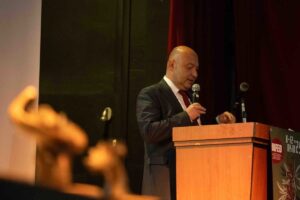
Bozcaada: Authoritarianism
The film by Michael Toledano, Jennifer Wickham, and Brenda Michell, «Yintah» (2024), 124 min., from Canada, gives us a first-hand account of the struggle of the Indigenous peoples in northern Canada, in the so-called territories , who, as indigenous people, are trying to protect their region from the intervention of investors who, with the blessing of the federal government, want to develop energy plants, destroying the environment. The directors prefer the style of filming we would see in Free Cinema, effortlessly highlighting the emotion, the nature of the uprising, and the reckless violence of state power. The message comes across to the viewer without difficulty.
The simple filming style becomes more complex as the film progresses, incorporating human emotion and justice in contrast to a policy that wants profit to be the only thing that matters. The film’s message is universal, as we see similar cases around the world that enrage sensitive people. Let us remember gold mining in Greece, in Chalkidiki, and the hundreds of wind turbines that have «sprung up» in the burned forests. Government repression there, here, and everywhere else is what wants to impose the absurd. The film angers you and pushes you to react to the absurdity.
«The Town That Drove Away», by Natalia Pietch and Grzegorz Piekarski, (2025) 70 min., Polish production, is a film that shows us how government authoritarianism controls the lives of the inhabitants of the ancient city of Hasankeyf. They are forced to move to the new city. The camera observes their behavior and hints at their reactions. The feeling of nostalgia, of love for one’s homeland, emerges from the shots that simply record, but give time to reveal what lies beneath the calm behavior of the residents who now live in state-owned houses and are not allowed to change anything.
Bozcaada: The contact
The film from Iraq, «Beneath Which Rivers Flow» (2025), 16 min., by Ali Yahya, was a cinematic poem. The film stars the river and people as archetypes, elements of world mythology. The river is a character in the narrative that interacts with people, who, through simple but powerful rituals, try to bring balance to the coexistence of man and nature. The rituals do not define, they imply, and when this allegorical narrative has developed, they speak clearly about respect for nature as something sacred, as was the case in ancient times and as is hidden in modern religious narratives.
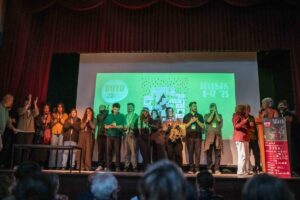
The film «Only on Earth» (2025), 90 min., by Robin Petré, a Danish production, films the fires in Spain. It is interesting to see the actions of humans recorded: those who capture wild horses to sell them and those who care for them. The horses convey a sense of being hunted, but also of danger when the environment is destroyed by flames. The film fails to highlight the fundamental contradictions that would bring the political issue to the fore.
Bozcaada: The workers
Two student films describe the lives of workers in different parts of the world. In the Portuguese production, «An Iron Crust» (2024), 20 min., by Vasco Barbero, we see the lives of workers in a factory. What is interesting about this film is the distancing of the dialogue, the letters read by the actors, and reality; this distance gives rise to emotion and politics.
The film «Yakut avcilari» (2024), 20 min., dramatically describes the work of diamond hunters. The harsh nature of the work, the fatigue, the dangers, their monotonous lives, are all dramatized and speak clearly about this way of life and the impact on the environment. The interviews with some of the hunters were unnecessary, as the cinematic narrative was perfectly explanatory.
A co-production between the US, Germany, and Cambodia, the film «Adidas owns the reality» (2024), 22 min., by Keil Orion Troisi and Igor Vamos, captures the falsehood of Adidas’ intentions and actions. The falsehood is revealed in the manner intended by Dziga Vertov in Cinema Verité. The truth is the oppression of workers, false promises, the violence of imperialism, and the owners’ thirst for profit at any cost.
Bozcaada: The stories
Two Lebanese productions. The first, «Along the Water» (2024), 22 min., by Rebecca Taouk, is, we could say, the story of water or what this water resource would like to tell us. We listen to the narratives and the rest comes to mind associatively. The director follows the school of Direct Cinema, she does not want to intervene in the narrative, at least not drastically. She lets the narrative itself speak to us about the problem of water resources and allows us to draw our own conclusions.
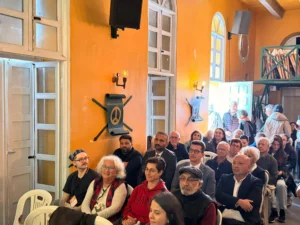
Rima Kaddissi’s film, «The Earth Weavers» (2025), 26 min., goes beyond the boundaries of cinema. The narrative concerns four women who act by coming into contact with nature. The narratives exist either literally or indirectly. The most important thing is the rituals that exist throughout the film. The director takes us back to the primordial (rituals) to transport us to our contemporary reality. With primordial knowledge, we can more easily understand nature as an experience and realize that we are part of it. In this way, the rituals transform the narrative, find the poetic, and give us a complete, high-quality film that approaches the school of Performance, according to the teachings of Jerzy Grotowski, since the cinematic text is inextricably linked to those of other arts, structuring a unified performative space.
Bozcaada: The awards
The closing ceremony was simple and meaningful. The speeches were translated into turkish and subtitled when they were in English, and vice versa, which was very nice and functional. The awards for the films and the honorary guest were announced, followed by the closing film. Afterwards, there was the usual party, as at all festivals. As you can imagine, this festival had nothing to envy from the others. Quite the contrary.
The grand prize, Fethi Kayaalp Büyük, went to the film «The Falling Sky» (2024), 110 min., by Eryk Rocha and Gabriela Carneiro da Cunha, produced in Brazil and Italy. The Madam Melpo award went to the film «Yintah» (2024), 124 min., by Michael Toledano, Jennifer Wickham, and Brenda Michell. The award for sound and sound design went to the film «Geographies of solitude» (2022), 103 min., by Jacquelyn Mills. The award for student films went to the film «Bloodline» (2024) 13 min., by Wojciech Weglarz. A special mention was given to the film «The town that drove away» (2025), 70 min., by Natalia Pietch and Grzegorz Piekarski. Domniki Peftitseli received an honorary award for her contribution to the Festival.
We look forward to seeing you next year in beautiful Tenedos.
Σχετικά άρθρα
-

-
 ΦΕΣΤΙΒΑΛ...
ΦΕΣΤΙΒΑΛ...Ιούλ 01, 2025 0
-
 ΦΕΣΤΙΒΑΛ ΓΑΛΛΟΦΩΝΟΥ...
ΦΕΣΤΙΒΑΛ ΓΑΛΛΟΦΩΝΟΥ...Μαρ 25, 2025 0
-
 Lidoriki Short Film Festival
Lidoriki Short Film FestivalΑυγ 02, 2024 0
Στην ίδια κατηγορία
-
 ΑΝΕΜΟΔΑΡΜΕΝΑ ΥΨΗ
ΑΝΕΜΟΔΑΡΜΕΝΑ ΥΨΗΜαρ 02, 2026 0
-
 ΤΟ ΜΕΓΑΛΕΙΟ
ΤΟ ΜΕΓΑΛΕΙΟΜαρ 02, 2026 0
-
 Ο ΔΡΟΜΟΣ ΤΟΥ...
Ο ΔΡΟΜΟΣ ΤΟΥ...Μαρ 02, 2026 0
-
 ΠΟΛΥ ΚΟΡΙΤΣΙΣΤΙΚΟ...
ΠΟΛΥ ΚΟΡΙΤΣΙΣΤΙΚΟ...Μαρ 01, 2026 0
Αναζήτηση
-
 WONDER WOMAN
WONDER WOMANΙούν 09, 2017 138
-
 ΠΑΙΔΙΚΗ ΣΚΗΝΗ
ΠΑΙΔΙΚΗ ΣΚΗΝΗΟκτ 12, 2014 2
-
 ΚΛΗΡΩΣΗ ΠΡΟΣΚΛΗΣΕΩΝ
ΚΛΗΡΩΣΗ ΠΡΟΣΚΛΗΣΕΩΝΜαρ 22, 2014 2
-
 ΔΥΟ ΜΕΡΕΣ, ΜΙΑ ΝΥΧΤΑ
ΔΥΟ ΜΕΡΕΣ, ΜΙΑ ΝΥΧΤΑΝοέ 13, 2014 2
-
 ΑΧΙΛΛΕΑΣ ΨΑΛΤΟΠΟΥΛΟΣ
ΑΧΙΛΛΕΑΣ ΨΑΛΤΟΠΟΥΛΟΣΝοέ 09, 2014 2
-
 ISTABUL FILM FESTIVAL
ISTABUL FILM FESTIVALΜαρ 08, 2014 2
-
 ΑΝΕΜΟΔΑΡΜΕΝΑ ΥΨΗ
ΑΝΕΜΟΔΑΡΜΕΝΑ ΥΨΗΜαρ 02, 2026 0
-
 ΤΟ ΜΕΓΑΛΕΙΟ
ΤΟ ΜΕΓΑΛΕΙΟΜαρ 02, 2026 0
-
 Ο ΔΡΟΜΟΣ ΤΟΥ ΕΓΚΛΗΜΑΤΟΣ
Ο ΔΡΟΜΟΣ ΤΟΥ ΕΓΚΛΗΜΑΤΟΣΜαρ 02, 2026 0
-
 ΟΙ ΕΥΘΥΜΕΣ ΚΥΡΑΔΕΣ
ΟΙ ΕΥΘΥΜΕΣ ΚΥΡΑΔΕΣΜαρ 02, 2026 0
-
 ΠΟΛΥ ΚΟΡΙΤΣΙΣΤΙΚΟ ΟΝΟΜΑ ΤΟ ΠΑΤΤΥ
ΠΟΛΥ ΚΟΡΙΤΣΙΣΤΙΚΟ ΟΝΟΜΑ ΤΟ ΠΑΤΤΥΜαρ 01, 2026 0
-
 Ο ΕΠΙΘΕΩΡΗΤΗΣ ΝΤΡΕΙΚ ΚΑΙ Η ΜΑΥΡΗ ΧΗΡΑ
Ο ΕΠΙΘΕΩΡΗΤΗΣ ΝΤΡΕΙΚ ΚΑΙ Η ΜΑΥΡΗ ΧΗΡΑΜαρ 01, 2026 0
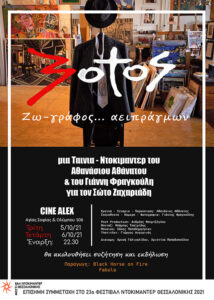
Δείτε το τρέιλερ της ταινίας μας, που συμμετέχει το Φεστιβάλ Ντοκιμαντέρ Θεσσαλονίκης.
SOTOS, EVERLASTING PAINTER (TRAILER)
Youtube
Επικοινωνήστε
ΓΙΑΝΝΗΣ ΦΡΑΓΚΟΥΛΗΣ
Email: info@filmandtheater.gr
Τηλ: (+30) 6974123481
Διεύθυνση: Ιωαννίνων 2, 56430, Σταυρούπολη Θεσσαλονίκη
![]()

